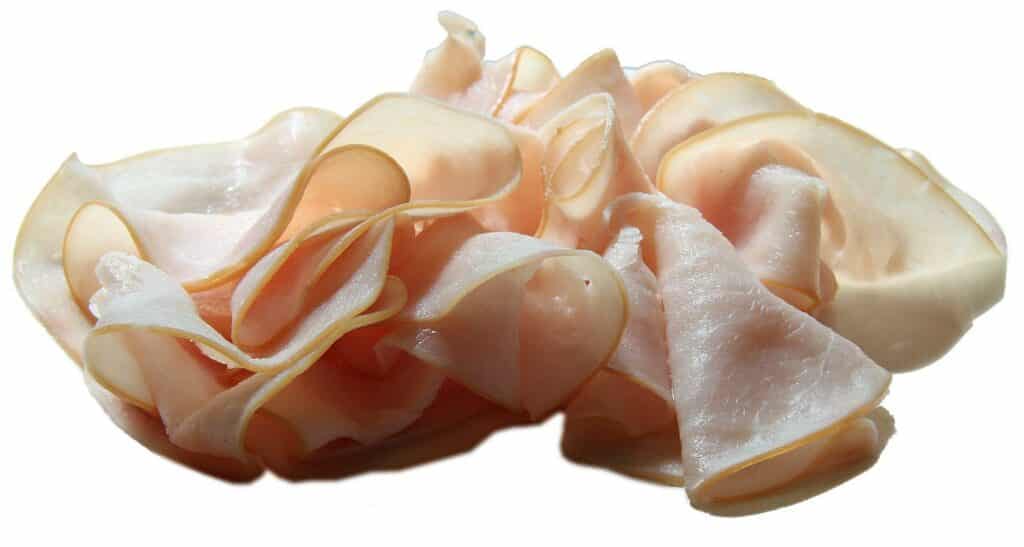Turkey ham is so irresistible to both humans and dogs.
Their carnivorous nature loves any sort of meat.
As you’re munching on that slice of ham, it’s guaranteed your dog is staring at you with those big, cute eyes and drooling.
It’s hard to deny them a piece, but consider their health before offering them a yummy turkey ham.
So, can dogs eat turkey ham? Yes.
In moderation, turkey ham is rich in protein and minerals like amino acids beneficial to your dog’s bones and muscle build-up.
Increased vitamins also help metabolize energy in the dog’s body.
Contrary, too much ham is harmful, especially with the high sodium levels that put your furry friend at risk of chronic diseases like diabetes, obesity, or kidney damage.
Be mindful of your dog’s health before giving them that yummy slice of turkey ham.
Although turkey ham is processed meat, it has nutritional value.
Know how to feed it to your dog, the benefits and what you should be concerned about in this article.
How to feed your dog turkey ham
Fewer additives
Choose turkey ham with fewer or no additives (nearly impossible with store-bought ham).
Avoid glazed and baked turkey ham since they are loaded with many sugars not recommended for your furry friend.
Opt for low-sodium turkey ham; although plain, your dogs will enjoy the meaty aspects without any extra dangers.

Moderation
Don’t feed your dog large chunks often.
Ensure the chunks are bite-size and only feed them as special treats occasionally.
A build-up of the sodium and fat content in the ham may lead to chronic diseases that can easily be avoided.
Remember that treats should never take up more than 10% of your dog’s diet.
Nutritional benefits of turkey to your dog
Rich in proteins
Turkey is a lean meat with high-quality protein levels; that supplies all the required amino acids for the growth and repair of tissues in dogs.
This protein is easy for dogs’ bodies to digest and use.
Great source of minerals
Turkey is rich in copper, magnesium, phosphorus, and zinc, which supports thyroid function, strengthens bones and muscles, improves immunity, and is an excellent energy source.
The turkey cut makes ham richer in iron which aids in growth and development.
Rich in vitamins
There’s a high content of the B group of vitamins, including vitamins B3, B6, and B12 in turkey meat.
These vitamins are essential for brain functioning, energy production, and cell development.
Low-fat content
Most poultry meat has low-fat content and is often stored just below the skin.
Although fat keeps the meat moist, succulents, and flavorful, it has great health concerns.
Luckily, most turkey fat is unsaturated and poly-saturated (omega 3 fatty acids), which is healthy for your dog if consumed in moderation.
It’s also a suitable replacement for red meat.
Cardiovascular health
Regular consumption of turkey meat is linked with improved heart health.
There’s a decreased risk of developing cardiovascular diseases when red meat is replaced with turkey.
This typically means longevity and survival are heightened.
Cancer
Poultry meat is associated with decreasing risks of developing some cancers.
In this case, consumption of turkey meat helps decrease the risks of lung cancer to some extent.
When is turkey ham bad for the dog?
Turkey ham is a processed product made with turkey meat, water, and ingredients like binders to hold the contents together.

Processed meat is linked with unhealthy lifestyles and chronic diseases.
In this instance, your dog may become diabetic or obese with an increased intake of turkey ham. Reason being;
High-fat content and cholesterol
Ham contains fat that’s not necessary for your canine companion.
If consumed regularly or in large amounts, the dogs risk weight gain leading to obesity.
Although turkey is low in fat, the ham is cured and overly processed, making it difficult for your dog to digest.
High sodium content
The level of sodium is high in processed foods compared to fresh meat.
This increases the chances of your dog developing diabetes and metabolic disorders if consumed often.
It’s better avoided as a dog treat or replaced with just white turkey meat.
Store-bought turkey ham, which is popular among households, is loaded with sodium-based preservatives like nitrates and nitrites.
Symptoms of high sodium intake in dogs
- Vomiting
- Diarrhea
- Lethargy
- Abnormal fluid accumulation
- Kidney damage
- Seizures or coma
What you should do when your dog consumes too much turkey ham
First, find out the amount they consumed.
If your dog ingests a small amount of turkey ham, they will be fine; no reason to panic.
Closely monitor them for stomach upset, vomiting, or diarrhea. Contact your vet immediately once they show these signs.
If your puppy eats large amounts, they might develop neurologic and gastrointestinal issues from the high fat and sodium in turkey ham.
Observe these signs, decreased appetite, vomiting, abdominal pain, and lethargy.
The signs may develop from mild to chronic within a short period and require immediate vet attention.
Frequently asked questions (FAQs)
How much turkey ham is enough for my dog
It depends on your dog’s age, weight, and general medical conditions.
The bottom line is to ensure that treats make up no more than 10% of the daily calorie intake.
Be wary and switch to less fatty alternatives like veggies if your dog is overweight.
However, your vet should recommend the exact amounts based on the age and health of your canine friend.
Is turkey ham with gluten safe for my dog?
No, gluten is toxic to some dogs.
Most canines are sensitive to gluten, and it causes severe stomach irritation if consumed in large quantities.
Even a tiny amount can cause vomiting or diarrhea for some dogs.
Conclusion
While small amounts of turkey ham are not bad for dogs, there are important considerations before throwing them a slice.
Your canine friend will enjoy a meaty treat while gaining benefits like muscle strength and improving cardiovascular health.
However, too much sodium and fat content are fatal to your dog. Consult your vet for any concerns.
But if your furry friend is in good health, treat them occasionally with a yummy turkey ham
- What Dog Breeds Have Pink Skin? - March 24, 2023
- What Are the Most Inspiring Dog Breeding Quotes? - March 20, 2023
- Can Pheromone Spray Help Improve Dog Breeding Results? - March 19, 2023








